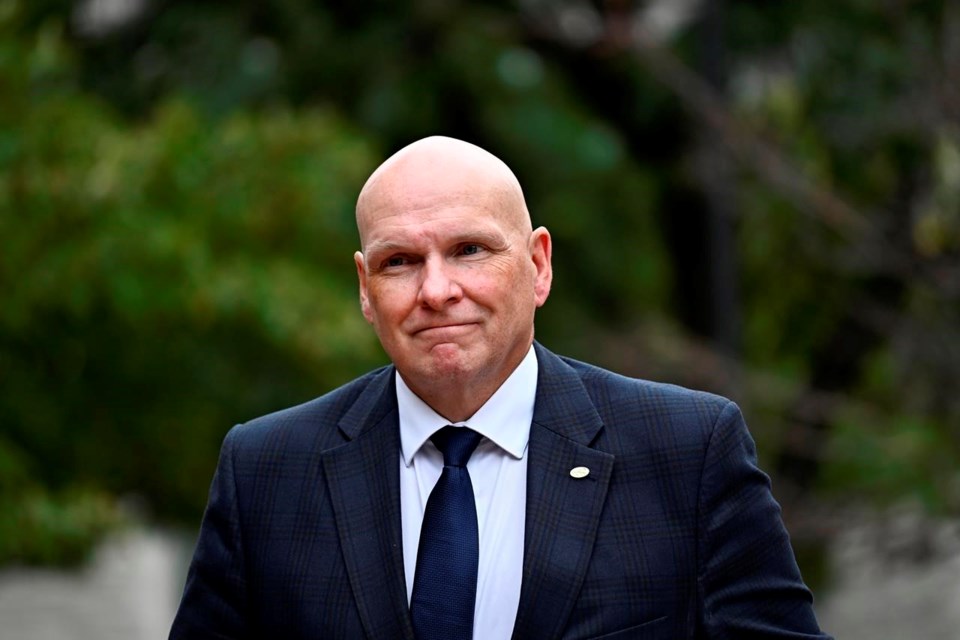Ottawa's manager of emergency services made repeated long walks away from the witness stand, past rows of spectators and into the hallway of the courthouse as his testimony in the trial of two "Freedom Convoy" organizers was halted over and over again Tuesday.
Kim Ayotte, who oversees city bylaw, paramedic and fire services and special events during last year's demonstrations, was called as a witness to share his perspective on how the protest unfolded over the course of three weeks.
But delays in his testimony ultimately led one of the defence lawyers to put the court on notice that she will need to consider asking for the case to be dismissed if the trial continues to be plagued with delays.
Chris Barber and Tamara Lich were arrested last year on Feb. 17 in the final days of the convoy protest that clogged the streets of Ottawa in demonstration against COVID-19 public health measures.
They were co-accused of mischief and counselling others to commit mischief and other offences.
The trial began Sept. 5, and was scheduled to run for 16 days — but it's been slow moving, and court has so far only finished the testimony of three witnesses.
The original timeline now appears to be all but impossible, as the judge looks for more trial dates in October and November.
Barber's lawyer Diane Magas says if the delays continue, she will need to consider making a Jordan application, which stipulates that any person charged with a crime has the right to be tried within a reasonable time frame.
"We have an obligation, if there's going to be an issue, that we raise it at the earliest opportunity so that the Crown can respond appropriately," Magas said outside of court.
The deadline for assessing whether a trial delay is reasonable is typically 18 months after the arrest, but in the case of Lich and Barber some of the delay is attributed to the defence.
That makes the deadline a "moving target" in this case, Magas said, since it's still unclear when the trial will actually end.
Ayotte's testimony was cut off again and again as he appeared unable to answer specific questions about his observations and actions during the convoy without referring to text and WhatsApp messages, emails and Teams chats with his staff.
None of those communications were obtained by the Crown or disclosed to the defence.
Ayotte arrived in court without the notes he took throughout the convoy protest, and told the court he didn't think he'd need them to refresh his memory during his testimony.
While he was able to share a general account of his actions, and recalled the dates of certain meetings, more detailed queries about specific dates and times were left unanswered.
He told the court he took approximately three walks through the protest zone, but couldn't recall the dates.
He testified under oath before a federal inquiry into the government's use of the Emergencies Act last year that he took only one walk. Lich's lawyer Lawrence Greenspon said nothing about the additional walks was disclosed to defence.
"This is yet another witness where the expansion of their evidence is not accompanied by the appropriate disclosure," Greenspon said.
The court retired a few minutes early Tuesday afternoon so the Crown could consider its options in light of Magas's comments.
The lawyers were able to put one issue aside for now: the admissibility of the "Freedom Convoy 2022" Facebook page posts and videos.
The Crown says it plans to use the posts to make the case that Barber and Lich were conspiring together so closely during the protest that evidence against one of them should apply to them both.
The defence had planned to argue against the inclusion of the Facebook content, saying posts that were not made directly by Lich or Barber themselves are irrelevant.
Lich and Barber's lawyers have now agreed to admit the posts as evidence, but say they will make their arguments about the conspiracy application on a post-by-post basis at the end of the trial.
Ayotte has been asked to return to the courthouse Wednesday to continue his testimony.
This report by The Canadian Press was first published Sept. 19, 2023.
Laura Osman, The Canadian Press



